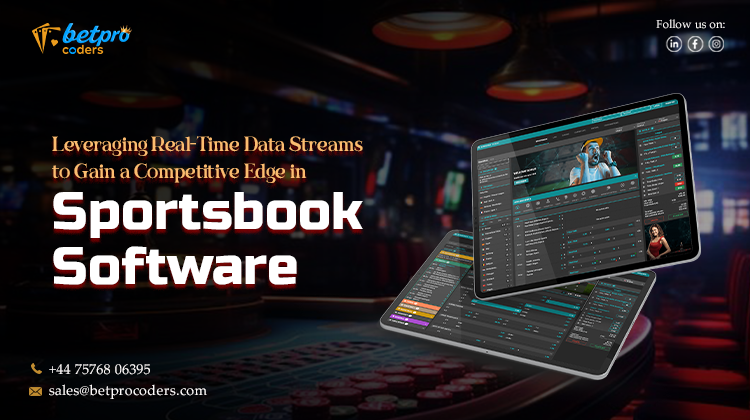In the fast-paced world of sports betting, real-time sportsbook software has emerged as the cornerstone of innovation and competitiveness. With the explosion of live events, in-play betting, and micro-markets, real-time data integration is no longer optional—it’s a necessity. Real-time sportsbook platforms enhance user experience, drive higher revenues, and offer bookmakers an unprecedented level of control. In this guide, we’ll explore the technical, strategic, and operational aspects of integrating real-time data streams into sportsbook software to stay ahead in 2025 and beyond.
Contents
- 1 What Are Real-Time Data Streams in Sports Betting?
- 2 The Role of Real-Time Data Streams in Modern Sportsbook Platforms
- 3 Technical and Architectural Foundations for Real-Time Sportsbook Platforms
- 4 Key Benefits of Real-Time Data Streams for Sportsbook Operators
- 5 Business Impact: Driving Competitive Advantage with Real-Time Capabilities
- 6 Challenges and Solutions in Implementing Real-Time Data Streams
- 7 Compliance, Security, and Reliability in Real-Time Sportsbook Software (2025 Standards)
- 8 Emerging Trends in Real-Time Data for Sportsbook Software (2025)
- 9 Selecting the Right Tech Stack for Scalable Real-Time Sportsbook Platforms in 2025
- 10 Real-World Case Studies: From Legacy to Lightning-Fast
- 11 How BetProCoders Can Help You Build a Real-Time Sportsbook in 2025
- 12 Conclusion
- 13 FAQs
What Are Real-Time Data Streams in Sports Betting?
Real-time data streams refer to the continuous flow of up-to-the-second information from live sports events, player statistics, odds changes, and market behavior. These streams power instant decision-making and are the backbone of features like live betting, instant cash-outs, dynamic odds, and automated bet settlement.
- Sources of Real-Time Data: These include official league data providers, sports federations, and third-party aggregators that deliver accurate and fast feeds.
- Types of Data: Real-time updates cover live scores, injuries, fouls, substitutions, betting odds, and other in-game events with time-stamped precision.
- Delivery Methods: WebSockets, APIs, and streaming tools like Kafka allow seamless and continuous data transmission to sportsbook platforms.
The Role of Real-Time Data Streams in Modern Sportsbook Platforms
In modern sportsbook software development, real-time data acts as the engine for functionality, automation, and user engagement.
- Live Betting: Real-time data powers constantly updated odds that reflect live events, enabling users to place bets instantly during matches.
- Dynamic Risk Management: Adjusts risk profiles and betting limits instantly based on betting activity, current game states, and volume changes.
- Enhanced User Engagement: Provides live stats, match trackers, and visualizations that maintain player interest throughout the sporting event.
Technical and Architectural Foundations for Real-Time Sportsbook Platforms
Building scalable real-time sportsbook platforms requires a robust backend architecture and resilient infrastructure.
- Microservices Architecture: Each function—such as odds calculation or user authentication is modular and independently deployable, ensuring scalability.
- Streaming Engines: Kafka, Flink, and Spark allow for real-time analytics, helping platforms respond instantly to user actions and match events.
- Load Balancing & Failover: Distributes traffic evenly and ensures continuity by rerouting traffic if a server fails or is overloaded.
- Data Caching: In-memory caching solutions like Redis deliver lightning-fast response times by reducing server-side data fetches.
Read Also: Sportsbook Software Development – An Exclusive Guide
Key Benefits of Real-Time Data Streams for Sportsbook Operators
Operators gain multiple advantages by investing in real-time sportsbook software with advanced data integration.
- Reduced Latency: Real-time feeds allow for immediate odds changes and outcomes, reducing errors and enhancing trust.
- Better Odds Management: Continuously updated data enables odds models to reflect current events and manage exposure efficiently.
- Higher User Retention: Fast and responsive systems improve user satisfaction and increase the likelihood of repeat betting activity.
- Automated Settlements: Bets are settled automatically after events conclude, speeding up payouts and reducing human errors.
Business Impact: Driving Competitive Advantage with Real-Time Capabilities
Real-time data not only improves operations—it reshapes business strategy.
- Market Differentiation: Real-time features like instant betting and live cash-outs give sportsbooks a competitive edge.
- Increased Revenue Streams: Faster betting loops and live wagers attract more bets per session, improving bottom-line revenue.
- Scalable Growth: Enables operators to efficiently serve larger audiences during high-demand sports seasons without compromising performance.
Challenges and Solutions in Implementing Real-Time Data Streams
Despite its advantages, integrating real-time data streams comes with hurdles.
- High Infrastructure Costs: Costs can be reduced by leveraging scalable cloud infrastructure and container orchestration systems.
- Data Accuracy and Redundancy: Employ multiple data vendors and reconciliation logic to ensure that critical data is correct and consistent.
- Latency Issues: Utilize content delivery networks (CDNs) and edge nodes to reduce physical distance and processing delays.
For Free Consultation
Contact Number: +447576806395
Email: [email protected]
Compliance, Security, and Reliability in Real-Time Sportsbook Software (2025 Standards)
Sportsbook software developers must comply with evolving data and gaming laws.
- Regulatory Compliance: Adherence to laws like GDPR and country-specific gaming regulations helps avoid legal issues and fines.
- Data Encryption & Tokenization: Protects user data through encryption at rest and in transit, and anonymizes sensitive information.
- Audit Logs and Transparency: Every user action and data event is logged, creating a transparent and verifiable system trail.
Read Also: Explore the Process of Sportsbook Software Development
Emerging Trends in Real-Time Data for Sportsbook Software (2025)
The future of real-time sportsbook software is shaped by emerging technologies.
- AI and Machine Learning: Drives intelligent recommendations, real-time odds modeling, and fraud detection through predictive analytics.
- Blockchain Integration: Creates verifiable records of bets, results, and transactions, promoting trust and fairness in the betting process.
- 5G and Edge Computing: Enhances speed and performance by placing processing power closer to users, reducing latency drastically.
Read Also: Sportsbook Software Development Cost
Selecting the Right Tech Stack for Scalable Real-Time Sportsbook Platforms in 2025
Choosing the correct technologies is critical to future-proof your platform.
- Backend: High-performance languages like GoLang, Node.js, or Java process large volumes of real-time data efficiently.
- Frontend: React and Angular provide smooth, dynamic user interfaces optimized for desktop and mobile sports bettors.
- Databases: Combine PostgreSQL for transactions and MongoDB for scalability and speed in non-relational data storage.
- DevOps: Kubernetes, Docker, and CI/CD ensure quick deployment cycles, infrastructure scalability, and minimized downtime.
Read Also: How to Choose the Best Sportsbook Software Provider for Your Business
Real-World Case Studies: From Legacy to Lightning-Fast
Several operators have gained a market edge by migrating to real-time sportsbook software.
- Case 1: A leading European sportsbook integrated live odds feeds and achieved a 30% surge in real-time in-play betting activity.
- Case 2: An Asian operator used Redis and Kafka to reduce latency by 60%, significantly enhancing user experience and bet accuracy.
- Case 3: A U.S. sportsbook applied AI-powered real-time personalization, which improved user retention and increased betting frequency.
How BetProCoders Can Help You Build a Real-Time Sportsbook in 2025
BetProCoders is a leader in sportsbook software development, specializing in real-time data integration, scalable architecture, and user-focused designs. Our expert sportsbook software developers can help you:
- Integrate live odds and stats feeds
- Design high-performance, low-latency platforms
- Ensure regulatory compliance and data security
- Customize features like multi-device access, admin panels, and automated payouts
Partner with BetProCoders to future-proof your sportsbook with real-time innovation.
Conclusion
Real-time sportsbook software is no longer an innovation—it’s an expectation. Operators who integrate live data streams can deliver exceptional betting experiences, optimize operations, and gain a sustainable edge in a competitive landscape. By combining smart technology choices, compliance, and UX design, sportsbook platforms can thrive in 2025 and beyond.
FAQs
1. What is a sportsbook data feed, and how does it function?
Answer: A sportsbook data feed is a continuous stream of sports information—scores, stats, odds delivered in real-time. It fuels sportsbook features like live betting and auto-settlement.
2. What is the importance of real-time data in sportsbook software?
Answer: It enables fast, accurate, and dynamic betting experiences, boosts engagement, and improves odds and risk management.
3. How can sportsbooks reduce latency in live betting platforms?
Answer: They can use edge computing, caching layers, and high-speed protocols like WebSockets to minimize delays.
4. What are the key features of premium sportsbook data feeds?
Answer: Speed, accuracy, redundancy, and global event coverage are essential features for high-quality sportsbook feeds.
5. How do real-time data streams enhance user engagement in sportsbooks?
Answer: By providing up-to-the-second updates, interactive visuals, and dynamic markets, they keep users engaged throughout live events.
6. How do sportsbooks handle compliance and data integrity with real-time data?
Answer: They use audit trails, regulatory reporting tools, and multi-source validation to ensure accuracy and transparency.
7. How do sportsbooks ensure data accuracy and integrity during live events?
Answer: By partnering with official data providers and using real-time validation algorithms and backups.
8. What challenges do sportsbooks face when integrating real-time data streams?
Answer: High infrastructure costs, latency, and regulatory compliance are key hurdles.
9. How is blockchain technology used in sportsbook platforms?
Answer: It is used for transparent bet logging, payout processing, and ensuring fairness.
10. What role does AI play in enhancing sportsbook user experience?
Answer: AI enables personalized betting suggestions, fraud detection, and dynamic odds modeling.
11. What security measures are essential for sportsbook software?
Answer: End-to-end encryption, DDoS protection, firewall systems, and secure APIs are critical.
12. How can real-time analytics improve sportsbook profitability?
Answer: By identifying user trends, optimizing odds, reducing churn, and predicting market behavior more









Leave a comment